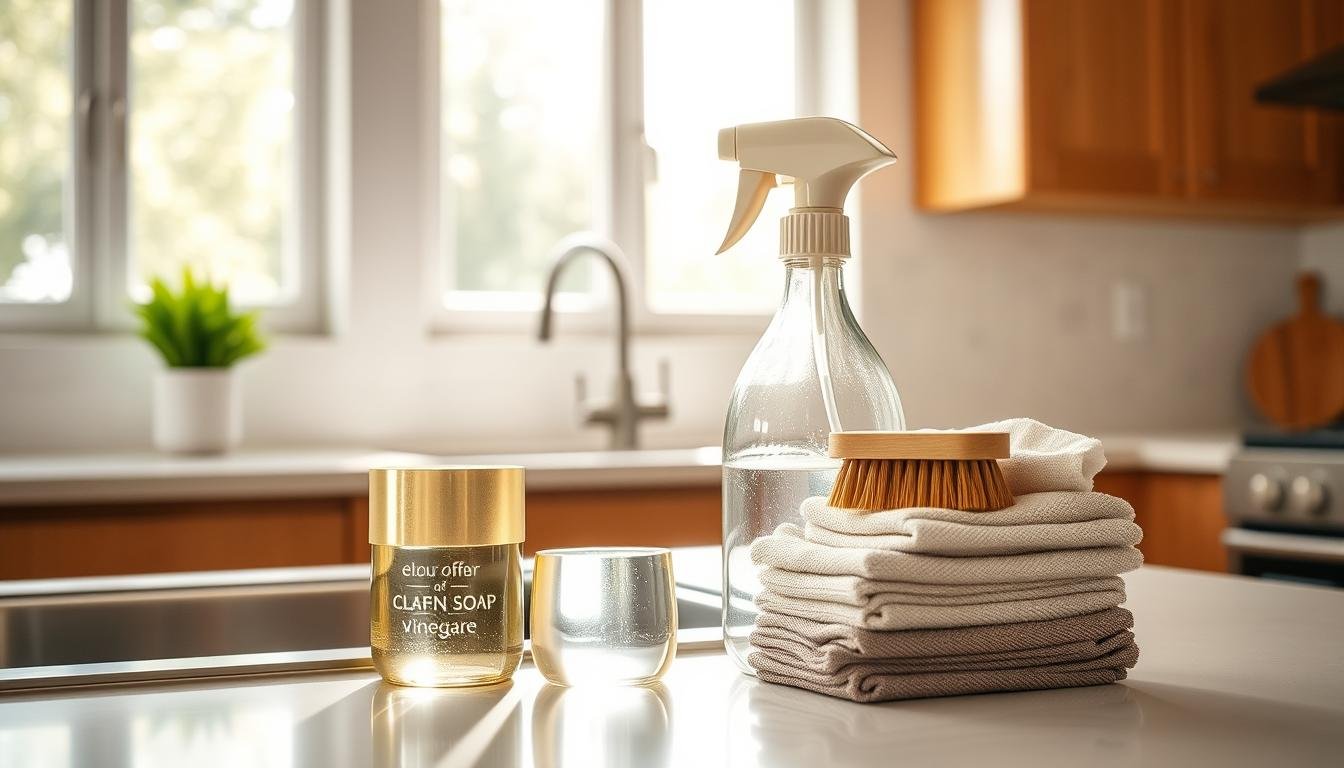
Zero Waste Kitchen Cleaning Routine Checklist
Zero Waste Kitchen Cleaning Routine Checklist | Eco-Friendly Guide
Adopting a zero waste kitchen cleaning routine is a significant step towards a more sustainable lifestyle. As we become more aware of the environmental impact of our daily choices, it’s essential to reassess our cleaning habits.

Traditional cleaning products often contain harsh chemicals that can harm the environment and our health. By switching to an eco-friendly cleaning routine, we can reduce our ecological footprint and create a healthier home.
This guide will walk you through the process of creating a zero waste kitchen cleaning routine checklist, providing you with practical tips and insights to make the transition smoother.
Table of Contents
Understanding Zero Waste Kitchen Cleaning
Embracing a zero-waste kitchen cleaning routine is a significant step towards a more sustainable lifestyle. As we become more aware of the environmental impact of our daily choices, the need for eco-friendly kitchen cleaning practices becomes increasingly important.
What Does Zero Waste Really Mean?
The term “zero waste” refers to a philosophy that aims to minimize waste to almost zero by redesigning the way we live, focusing on reducing, reusing, and recycling. In the context of kitchen cleaning, it means adopting practices and using products that generate minimal to no waste.
Environmental Impact of Conventional Cleaning Products
Conventional cleaning products often contain harsh chemicals that can harm the environment. These chemicals can pollute waterways, contribute to air pollution, and even affect human health. By switching to sustainable kitchen cleaning tips and products, we can significantly reduce our ecological footprint.
For instance, choosing products with minimal or biodegradable packaging, and those that are free from toxic chemicals, can make a big difference. It’s about making conscious choices that support a healthier planet.
Essential Eco-Friendly Cleaning Supplies
Embracing a zero-waste kitchen cleaning routine starts with the right eco-friendly cleaning supplies. Having the correct tools and products not only makes cleaning more efficient but also significantly reduces environmental impact.

Sustainable Cleaning Tools
Sustainable cleaning tools are designed to be durable and long-lasting, reducing the need for frequent replacements. Examples include microfiber cloths, which are effective for cleaning surfaces without chemicals, and bamboo brushes, which offer a biodegradable alternative to plastic brushes.
Plastic-Free Alternatives
Switching to plastic-free alternatives is a crucial step in a zero-waste kitchen. Consider using beeswax wraps instead of plastic wrap for food storage, and opt for refillable cleaning product containers to reduce waste. These simple changes can make a significant difference.
Where to Find Sustainable Cleaning Products
Sustainable cleaning products are becoming increasingly accessible. You can find them at local health food stores, eco-friendly online retailers, or even make your own cleaning solutions using natural ingredients. Always look for products with minimal packaging and biodegradable ingredients.
By incorporating these essential eco-friendly cleaning supplies into your routine, you’ll be well on your way to a more sustainable kitchen.
Natural Ingredients for DIY Cleaning Solutions
Nature provides us with an array of effective and eco-friendly cleaning agents. By harnessing the power of natural ingredients, you can create a cleaning routine that is not only effective but also environmentally friendly.
Vinegar: The Multi-Purpose Cleaner
Vinegar is a versatile and effective natural cleaner. Its acidic properties make it perfect for dissolving grease, removing stains, and deodorizing surfaces. To use vinegar as a cleaner, mix it with water in a spray bottle. It’s ideal for cleaning countertops, sinks, and mirrors.
Baking Soda: The Gentle Scrubber
Baking soda is another natural ingredient that is gentle yet effective. It acts as a mild abrasive, making it perfect for scrubbing away tough stains without damaging surfaces. Mix baking soda with water to form a paste, and use it to clean ovens, sinks, and countertops.
Citrus: Nature’s Degreaser
Citrus fruits like lemons and oranges are not only a great source of vitamin C but also natural degreasers. The peels can be used to clean surfaces, leaving a fresh and clean scent. You can make a citrus cleaner by boiling citrus peels in water and then using the cooled liquid as a cleaning solution.
Essential Oils for Cleaning and Fragrance
Essential oils can add fragrance to your cleaning solutions and provide additional cleaning benefits. For example, tea tree oil has antibacterial properties, making it a great addition to your natural cleaning arsenal. Mix a few drops of your preferred essential oil with your cleaning solution for a pleasant scent.
| Natural Ingredient | Uses | Benefits |
|---|---|---|
| Vinegar | Dissolving grease, removing stains, deodorizing | Effective, eco-friendly, multi-purpose |
| Baking Soda | Scrubbing tough stains, cleaning ovens and sinks | Gentle, non-toxic, abrasive |
| Citrus | Degreasing, leaving a fresh scent | Natural, fragrant, eco-friendly |
| Essential Oils | Adding fragrance, antibacterial properties | Pleasant scent, additional cleaning benefits |

By incorporating these natural ingredients into your cleaning routine, you can maintain a clean and eco-friendly kitchen. Experiment with different combinations to find what works best for you.
Zero Waste Kitchen Cleaning Routine Checklist | Eco-Friendly Guide
Creating a zero-waste kitchen cleaning routine is simpler than you think, and it all starts with a clear checklist. By breaking down tasks into manageable daily, weekly, and monthly activities, you can maintain a clean and eco-friendly kitchen with minimal effort.
Daily Cleaning Tasks
Daily tasks are crucial for maintaining a clean and hygienic kitchen. Start by wiping down countertops with a damp cloth after every meal to prevent crumbs and spills from building up. Make it a habit to wash dishes immediately after dinner or load them into the dishwasher. Additionally, quickly sweep or vacuum the floor to keep it clean.
- Wipe down countertops
- Wash dishes or load the dishwasher
- Sweep or vacuum the floor
Weekly Cleaning Tasks
Weekly tasks help tackle deeper cleaning needs. Dedicate time to cleaning the refrigerator, stove, and sink. Use eco-friendly cleaning products to wipe down surfaces and remove any stubborn stains. Don’t forget to mop the floors with a natural cleaner to keep them shining.
| Task | Frequency | Cleaning Agent |
|---|---|---|
| Clean refrigerator | Weekly | Baking soda and water |
| Wipe down stove | Weekly | Vinegar and water |
| Mop floors | Weekly | Castile soap and water |
Monthly Deep Cleaning Tasks
Monthly deep cleaning tasks are essential for tackling tough grime and grease buildup. Focus on the oven, cabinets, and any areas that tend to accumulate grime. Use natural ingredients like baking soda and vinegar to create effective cleaning solutions.

By following this zero-waste kitchen cleaning routine checklist, you’ll be able to maintain a clean, eco-friendly kitchen with ease. Remember, the key is consistency and using the right eco-friendly cleaning supplies.
Sustainable Cleaning Methods for Different Kitchen Surfaces
A zero-waste kitchen isn’t just about the products you use, but also how you clean various surfaces. Different kitchen surfaces require tailored cleaning approaches to maintain their integrity and hygiene.
Countertops and Backsplashes
For countertops and backsplashes, a mixture of vinegar and water is an effective and eco-friendly cleaning solution. This method is gentle on surfaces and doesn’t leave harsh chemical residues. For tougher stains, a paste made from baking soda and water can be used.
Stovetops and Ovens
Stovetops and ovens benefit from natural degreasers like citrus-based cleaners or a homemade mixture of lemon juice and baking soda. These environmentally friendly options cut through grease without damaging the surfaces.
Sinks and Faucets
Sinks and faucets can be kept sparkling with a simple mixture of baking soda and vinegar. This combination is not only effective but also safe for the environment. Regular cleaning with this method prevents grime buildup and maintains the shine on faucets.
By adopting these sustainable cleaning methods, you can maintain a clean, hygienic, and environmentally friendly kitchen. Each surface requires a specific approach, but with the right techniques and natural cleaning agents, your kitchen can shine without harming the planet.
Eco-Friendly Appliance Cleaning Guide
Adopting green cleaning practices for your kitchen appliances is easier than you think and makes a significant difference. By switching to eco-friendly cleaning methods, you not only reduce your environmental footprint but also create a healthier kitchen environment.
Refrigerator Cleaning Without Waste
Cleaning your refrigerator doesn’t have to involve harsh chemicals or generate unnecessary waste. Start by removing all contents and wiping down shelves with a mixture of warm water and white vinegar. For tougher stains, baking soda is a gentle yet effective scrubber. Consider using reusable cloths or sponges to reduce paper towel waste.
- Remove and clean shelves and drawers
- Wipe down the fridge walls and floor
- Check expiration dates and dispose of expired items responsibly
Dishwasher Maintenance the Green Way
Maintaining your dishwasher in an eco-friendly way involves regular cleaning and checking for blockages. Run a cleaning cycle with white vinegar monthly to remove grease and odors. Ensure you’re using eco-friendly dishwasher detergent and loading the dishwasher efficiently to minimize water and energy usage.
- Run a vinegar cleaning cycle monthly
- Check and clean filters regularly
- Use eco-friendly dishwasher detergent
Small Appliances Cleaning Tips
Small appliances like toasters, blenders, and coffee makers can harbor bacteria and grime. Clean them regularly with a damp cloth and mild soap. For tougher grime, a mixture of baking soda and water can be effective. Descale appliances like coffee makers with vinegar to remove mineral deposits.
- Wipe down appliances with a damp cloth
- Use baking soda for tough grime
- Descale appliances regularly
Zero Waste Dish Washing Techniques
Washing dishes is an essential part of kitchen cleaning, and adopting zero-waste methods can significantly reduce our environmental footprint. By implementing sustainable hand washing methods and optimizing dishwasher use, we can minimize water and energy consumption.
Sustainable Hand Washing
Hand washing dishes can be an eco-friendly alternative to using a dishwasher. Use warm water instead of hot, and turn off the tap while soaping dishes. Consider using a sink with two compartments: one for washing and one for rinsing.
Optimizing Dishwasher Use
For those who prefer using a dishwasher, ensuring it’s fully loaded before running a cycle can maximize efficiency. Choose an energy-efficient dishwasher and use the eco-cycle when available. Regular maintenance, such as cleaning the filter, can also improve performance.
Transitioning to a zero-waste kitchen is a process that involves assessing your current cleaning products, identifying eco-friendly alternatives, and implementing changes gradually.
To start, take stock of your cleaning supplies and note their ingredients, packaging, and expiration dates. This will help you identify areas for improvement.
Auditing Your Current Cleaning Products
Consider the products you use most often and look for alternatives that are gentler on the environment.
| Product | Current | Eco-Friendly Alternative |
|---|---|---|
| All-purpose cleaner | Chemical-based | Natural ingredients |
| Glass cleaner | Ammonia-based | Vinegar-based |
Implementing Gradual Changes
Start with small changes, like switching to eco-friendly cleaning products or making your own cleaning solutions. As you become more comfortable, you can continue to make adjustments to achieve a zero-waste kitchen.
Food Storage and Waste Management
Maintaining a zero-waste kitchen involves more than just cleaning; it also requires proper food storage and waste management. Effective strategies in these areas can significantly reduce the environmental impact of your kitchen.
One crucial aspect is adopting plastic-free food storage solutions. This not only reduces plastic waste but also helps in maintaining the freshness of your food. Options include using glass containers, stainless steel containers, and beeswax wraps. These alternatives are not only eco-friendly but also durable and versatile.
Plastic-Free Food Storage Solutions
Switching to plastic-free storage solutions is a straightforward step towards a more sustainable kitchen. Glass containers are ideal for storing leftovers and can be used for both refrigeration and freezing. Stainless steel containers are another excellent option, offering durability and a modern look. For wrapping food, beeswax wraps provide a reusable and compostable alternative to plastic wrap.
Composting Kitchen Scraps
Composting kitchen scraps is another vital practice for reducing waste. By composting, you can divert a significant amount of organic waste from landfills and create a nutrient-rich soil amendment for your garden. Start by setting up a compost bin or pile and include kitchen scraps like vegetable peels, fruit rinds, and coffee grounds. Regular maintenance, such as turning the compost, will help it decompose efficiently.
By implementing these strategies, you can significantly reduce your kitchen’s environmental footprint. Not only will you be reducing waste, but you’ll also be contributing to a more sustainable food system.
Tackling Tough Kitchen Cleaning Challenges Naturally
Maintaining a zero-waste kitchen involves more than just recycling; it includes cleaning sustainably. Tough kitchen cleaning challenges like stubborn grease, mold, and mildew, and clogged drains can be resolved using natural methods.
Removing Stubborn Grease
Grease can be a significant problem in kitchens. Using natural degreasers like vinegar or baking soda can effectively cut through grease without harsh chemicals. Simply apply the degreaser to the greased area, let it sit for a few minutes, and then scrub off.
Dealing with Mold and Mildew
Mold and mildew thrive in damp environments. To combat them, use a mixture of water and tea tree oil, known for its antifungal properties. Spray the solution onto affected areas, let it sit, and then wipe clean.
Natural Drain Cleaning Methods
Clogged drains can be a nuisance. Instead of using chemical drain cleaners, try using a combination of baking soda and vinegar. Pour the mixture down the drain, followed by hot water, to clear blockages naturally.
By adopting these natural kitchen cleaning tips, you can maintain an eco-friendly kitchen cleaning routine that’s both effective and sustainable.
Conclusion
By adopting the practices outlined in this guide, you’ll be well on your way to a more sustainable kitchen. The zero waste kitchen cleaning guide has provided you with the tools and knowledge to make a positive impact on the environment. As you continue on this path, you’ll not only be reducing your environmental footprint, but also creating a healthier and more sustainable home.
FAQs
What is the first step in transitioning to a zero-waste kitchen?
The first step is to audit your current cleaning products and identify areas for improvement.
How can I make my kitchen cleaning routine more eco-friendly?
You can start by switching to eco-friendly cleaning products, reducing water waste, and using reusable cleaning cloths.
What are some natural alternatives to chemical-based cleaning products?
Some natural alternatives include using vinegar, baking soda, and essential oils to clean your kitchen.
How often should I clean my kitchen to maintain a zero-waste environment?
Regular cleaning is key; aim to clean your kitchen daily, with a deeper clean weekly or monthly.
Can I use homemade cleaning solutions on all surfaces?
No, some surfaces may require special care; always test a small area first to ensure the solution won’t damage the surface.
How can I reduce waste when cleaning my kitchen?
Reduce waste by using reusable cleaning cloths, avoiding single-use cleaning products, and choosing products with minimal packaging.
Are eco-friendly cleaning products more expensive?
Not always; many eco-friendly cleaning products are comparable in price to their chemical-based counterparts, and some can be made at home using inexpensive ingredients.
Can I use zero-waste cleaning methods with a busy schedule?
Yes, many zero-waste cleaning methods can be adapted to fit a busy schedule, such as quick daily cleanups and using multi-purpose cleaning products.



Сопровождение ВЭД позволило исключить человеческий фактор и упростить весь процесс импорта: https://vsoprovozhdenie.ru/
Мелкие заказы тоже – перевод документов нотариально заверенный самара. Перевод сертификатов соответствия. Самарское бюро. Нотариальное заверение. Срочно и качественно. Опытные переводчики.
Gamvipm88, yo! It’s got some alright things going on. Check it out! gamvipm88
Yo, 100 jilislot got some fire slots! Been hitting some nice wins lately. The layout’s clean, easy to find what you’re looking for. Worth checking out if you’re chasing those jackpots! Go check out 100jilislot now!